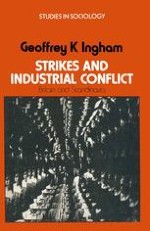1974 | OriginalPaper | Buchkapitel
Conclusion
verfasst von : Geoffrey K. Ingham
Erschienen in: Strikes and Industrial Conflict
Verlag: Palgrave Macmillan UK
Enthalten in: Professional Book Archive
Aktivieren Sie unsere intelligente Suche, um passende Fachinhalte oder Patente zu finden.
Wählen Sie Textabschnitte aus um mit Künstlicher Intelligenz passenden Patente zu finden. powered by
Markieren Sie Textabschnitte, um KI-gestützt weitere passende Inhalte zu finden. powered by
THE emphasis in this essay has been on only one aspect of the institutionalisation of industrial conflict; namely, the effects of infrastructural variations on this process. The implication of this selectivity that such an approach must form the basis for any account of the normative content of industrial relations systems is one to which I freely admit. However, it has not been my intention to imply that such institutional systems can be completely understood by reference to the infrastructures in which they are placed. For example, it was tentatively suggested that the strength of the British state contributed to the inherent organisational weakness of employers’ associations which was evident in their unwillingness to unilaterally impose normative regulation on industrial relations. The point may be generalised; that is to say, in all cases of capitalist economic development, the regulation of class conflict in industry has been the outcome of particular and varied configurations of power between workers, employers and the state. Thus, any extension of the kind of analysis I have presented must examine the relationships between variations in the structure of capitalist ‘ruling classes’ and different state structures.
